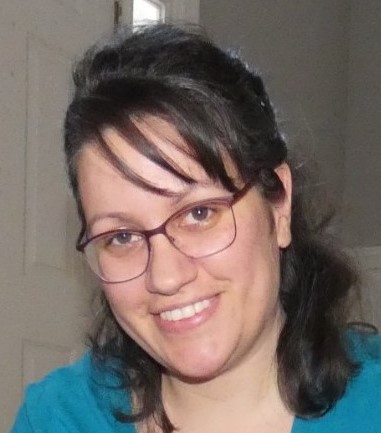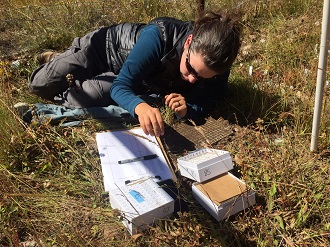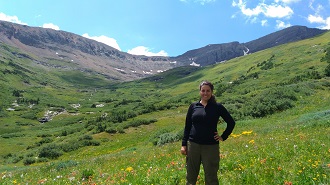About the department:
The Biology Department at Davidson College is large for an undergraduate institute and quite broad in scope, so our research programs span study systems, subfields, and biological levels of organization. I’m constantly inspired, motivated, and encouraged by my colleagues and by our incredibly driven and accomplished students. I enjoy the teaching, research, and service aspects of being a faculty member, and am grateful to work at a place where all three contributions are appreciated.
About the research:
My research program explores the evolutionary ecology of plants. We study the processes that promote or hinder adaptations in plants, with particular interests in the influences of genetics vs. the environment, climate change, and conservation. Current projects in the lab use manipulative experiments and demographic modeling to explore the adaptive nature of transgenerational plasticity, sex allocation strategies, and assisted gene flow.
What has been the biggest challenge as a new PI so far?
The feeling that nothing that I ever work on is finished to my satisfaction. With more time, I could have perfected a lecture, or sent a manuscript to a colleague on time and in better shape, or contributed more to a committee I was a part of, or attended an event in another department. I’m still learning how to let go, move on, stop apologizing, and to celebrate small accomplishments.
What has been the biggest surprise so far about being a new PI?
I was surprised at how striking the transition from postdoc to PI was. I showed up at my new job one day and had an empty office and lab to start setting up, start-up funds to spend at my own discretion, and no one else to really hold me accountable for my time or productivity. It’s liberating, but it took a while for me to settle into a rhythm and feel like I was ‘doing it right’.
Are you recruiting? If so, how do you/ will you choose new lab members?
Yes, I am continuously recruiting. One of the benefits of working at an undergraduate institution is that new students regularly join your lab for various amounts of time. This produces a dynamic and busy lab group with the regular addition of fresh perspectives. I look for students who are enthusiastic about science and are excited to collaborate with me and other lab members.
When and why did you become a SSE member?
I first joined SSE in 2012 when I attended the Evolution meeting in Ottawa. A lot of the literature I was reading at the time was published in Evolution, and I had heard wonderful things about the Evolution meetings. I remember noticing how laid back and supportive everyone was, and it helped me to envision myself as a part of the scientific community in the future.
What does becoming a SSE member mean to you or your career?
Attending Evolution meetings has provided me with invaluable opportunities for networking, practicing science communication, and expanding knowledge. I always feel invigorated and inspired by the talks that I see. And of course, the meetings are an irresistible opportunity to see old friends and make new ones in a safe, geeky space. I look forward to them each year that I can attend.
Do you have a funny story to share from an Evolution Meeting?
At the 2013 Evolution meeting in Snowbird, UT, a few faculty, postdocs, and students took a lift up the mountain and then slid down the ski slope on our butts. In hind sight, it probably wasn’t the safest thing to do, but it was thrilling. That evening, I may have witnessed a leg wrestling match between two prominent professors in Evolutionary Biology. It was a fun and memorable conference.
Do you remember your first publication in Evolution or Evolution Letters (acceptance or rejection)?
I remember it vividly. We struggled with choosing a journal to submit a manuscript to, and ended up deciding on Evolution Letters. It hadn’t produced an issue yet at that point, but its aims and scope appealed to us. The editor and reviewer comments were thorough and incredibly helpful, and it was published in the inaugural issue. I would definitely submit there again.
Do you teach evolution? What is the hardest concept to teach?
I teach about evolution during my introductory biology and evolutionary ecology courses. I think a common misconception that people have is that evolution has a direction. That favorable mutations may arise more often when needed, that natural selection will always produce a fixed, final, and optimal form, and that species can ‘deevolve’. Evolutionary processes are much more dynamic and are not anticipatory, which makes them harder to predict but more interesting to study.
How do you think evolutionary research benefits society?
Evolutionary research characterizes how the natural world operates and came to be. Moreover, our research informs and benefits many common and important aspects of society, from antibiotic resistance and crop improvement to policy decisions and providing the narratives of our favorite nature shows. The benefits of evolutionary research and of the scientific process could be made more clear and accessible if we increased our outreach and science communication efforts.
Do you have a favorite science podcast or blog?
In Defense of Plants is amazing, and I will be using a good deal of their content in an upcoming course.
What one piece of advice would you give to a starting graduate student?
I have two pieces of advice. First, there is no rush to go straight to graduate school after you finish undergrad. I have many friends, myself included, that took ‘unconventional’ routes to graduate school, including traveling, working full time outside of academia, or working as a lab technician or field assistant. There isn’t a single professor out there who would see these experiences as a negative. Second, don’t hesitate to advocate for what you need to succeed both personally or professionally. I went to grad school at an R1, but loved teaching and wanted to gain experience. I took a course on teaching in higher education and then took a formal leave of absence to teach a course before returning to write my thesis and defend. There was some pushback against this at first, but it was what I needed to orient and motivate myself moving forward.
What one piece of advice would you give to a postdoc?
I know it is tempting to start panicking about the job market the second you graduate from grad school, but my advice would be to take some time to enjoy being a postdoc for a while. In a way, you have the most freedom you will have for some time to indulge in whatever your postdoc entails... research, mentoring, writing, teaching, etc. This is the time to really figure out what you enjoy and what you want your future to be, whether it’s to continue in academia or not.
How was your first faculty meeting?
At Davidson College, all new faculty start over the summer, but faculty meetings don’t begin until the fall semester. The first college-wide faculty meeting of the academic year focuses on welcoming new faculty and staff, updating us on the college’s accomplishments in the past academic year, and briefly introducing us to the incoming cohort of students. It was more like a pep-rally than a meeting, and it left me feeling really excited about the upcoming year.
What is something most people don’t know about you?
If music is playing, I will start to vividly daydream, no matter what I’m trying to do. Sometimes that is ok, but if I need to concentrate, I have to listen to podcasts, the news, or a constant drone of background noise.
What do you enjoy doing in your free time?
I spend nearly all of my free time playing with my kids these days, which means I spend a lot of time reading books, playing make-believe, and taking walks. I also enjoy crocheting, reading sci-fi and fantasy books, and cooking.
 Susana M. Wadgymar
Susana M. Wadgymar
